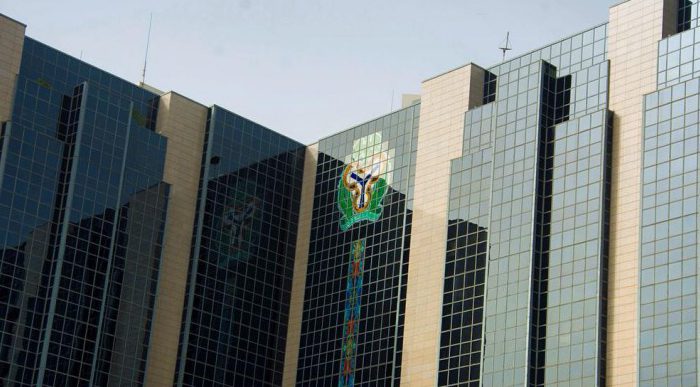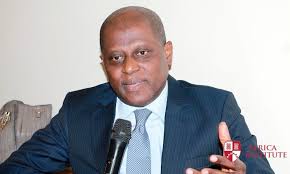VenturesNow
Group pushes for reinstatement of dismissed staff of Nigeria’s central bank
Published
7 months agoon

A few irate former workers of the Central Bank of Nigeria are still processing the shock of their abrupt termination and are accusing the administration of unfair treatment and mistreatment, and asserting that it was against the bank’s human resource policies and procedures for many of them to not receive their benefits before being fired.
The North Central Coordinator of the Conference of Autochthonous Ethnic Communities Development Association Youth Wing, Paul Dekete, demanded the prompt reinstatement of the fired employees in a statement released on Sunday in Jos, the capital of Plateau State.
The statement read, “The purge wasn’t limited to high-level executives. It extended far beyond directors, impacting Deputy Directors and Assistant Directors who formed the backbone of departmental operations. These were not junior staff; they were seasoned professionals with deep institutional knowledge.
“For example, the Director of Information Technology was overseeing crucial projects on the very day they were terminated, including efforts to secure international information security certifications for the bank.
“In a particularly egregious case, a Director on special assignment, tasked with leading the bank’s efforts to secure an ISO certification for information security, was sacked on the very day the bank successfully achieved this crucial milestone.
“Central banking relies heavily on robust cybersecurity measures, and this certification is a testament to the Director’s competence and the bank’s commitment to financial security. This abrupt dismissal, on the day of a major accomplishment, raises serious questions about the planning and rationale behind the mass layoffs.”
The statement further said, “The mass sack violated the bank’s own HR policy, which mandates board approval for executive terminations.
“This blatant disregard for due process has raised serious questions about transparency. The CBN, a federal institution, must adhere to public service rules. This dismissal exercise, carried out without board approval, lacks a solid legal foundation.
“Making matters worse, the bank offered no clear criteria for the mass sacking. This is a stark departure from their established culture of clear communication with staff during downsizing exercises.”
Dekete, for the sacked CBN workers further said, “Loyal employees, some with over 30 years of dedicated service, were cast aside with a cold, impersonal letter stating “your services are no longer required.” This callous act extended to a Deputy Director who was let go even though she had already completed all the necessary paperwork and her retirement letter was ready to be issued.
“The human cost of this heartless exercise is staggering. Many staff members had used their salaries as collateral for loans tied to their remaining years of service at the CBN. With their abrupt termination, these loans were immediately deducted from their final paychecks, leaving some with nothing and others still indebted to the bank. The impact on these individuals and their families is devastating, with their dreams and financial security shattered in an instant.
“The CBN’s purge extended beyond individual hardship, raising serious concerns about ethnic bias. Reports indicate that some states saw over 80% of their executive staff removed, with North Central and South Eastern regions disproportionately affected. This blatant disregard for the principle of federal character raises troubling questions about the bank’s commitment to national unity.
“Staff morale has plummeted, with a pervasive sense of fear and uncertainty gripping the institution. Every Friday is met with dread, as rumours swirl of another list of targeted employees. The reported use of an external consultant, seemingly unfamiliar with the bank’s HR policies and civil service regulations, only exacerbates the lack of trust and transparency.”
The entire Economic Intelligence Unit (EIU), a division of the bank entrusted with the vital duty of detecting and keeping an eye on illicit financial activity within Nigeria, was among the units that the CBN mass-fired. The EIU was painstakingly assembled in 2018 by hand-selecting the most intelligent individuals from the bank’s departments.
Dekete claims that the departure of these highly qualified individuals is a serious setback to the bank’s institutional knowledge and ability to stop money laundering and other illegal financial activity.He noted that the nature of the sack shows an attempt to cripple the Middle-belt region of the state as Gombe, Plateau and Benue are affected most.
“In Gombe State, five people cutting across Deputy Directors to Assistant Directors cadre were all dismissed courtesy of the re-organization of the bank. In Plateau, 80% of the staff in the executive cadre were sacked, including one who had 3 days to retire and arrangements had been concluded for her normal retirement.
“Benue is not spared either as many Deputy Directors are affected. Very painful is that Mr Onoja Ameh who was transferred from Abuja to Awka Branch last year December was involved in a terrible accident in April this year during which he almost lost his life on his way back to Awka after visiting his family in Abuja is still recuperating when he got sacked. A widow who is currently nursing her trauma was also sacked from the region due to the ‘re-organisation’ of the bank.
“All termination decisions should be reviewed to ensure compliance with CBN HR policy and public service rules. This may involve reinstating some employees who were dismissed without proper justification.
“With most of the casualties arising from the Middle Belt and the South Eastern regions of the country, we call on the Governor of these regions to as a matter of urgency step into the ugly development to unravel the mystery behind the motive to correct it”, the statement said.
You may like
-


Nigeria’s state of business will shortly improve— Central Bank Report
-


Nigeria’s central bank to punish banks for rejecting outdated dollar bills
-


Nigeria: SERAP gives CBN Gov seven days to account for missing N100bn dirty notes, others
-


Legislators in Nigeria move to reduce central bank’s influence
-


Private sector concerned as Nigeria’s central bank raises interest rate to 26.25%
-


Tinubu reportedly orders CBN to suspend unpopular cybersecurity levy after public outcry
VenturesNow
Nigeria: Marketers predict further price cut as another refinery begins operations
Published
3 weeks agoon
December 31, 2024
Oil marketers and the Nigerian Midstream and Downstream Petroleum Regulatory Authority expect refined petroleum product prices to reduce as another public refinery in Warri begins operations.
The marketers made the prediction when the Nigerian National Petroleum Company Limited launched the 125,000-barrel-per-day Delta State WRPC. NNPCL also wants to export locally refined goods for foreign cash. Last month, the 60,000-barrel-per-day Port Harcourt Refinery in Rivers State began operations.
During an inspection tour of the facility on Monday, the NNPCL Group Chief Executive Officer, Mele Kyari, explained that the inspection aimed to show Nigerians the level of work completed so far.
During a tour with NMDPRA CEO Farouk Ahmed and NNPC Board Chairman Pius Akinyelure, Kyari said that while facility repairs were not yet 100% complete, refining operations had begun and would produce straight-run kerosene, diesel and naphtha.
In a statement commemorating the milestone, President Bola Tinubu stated the plant is functioning at 60% or 75,000 barrels per day.
Kyari said, “We are taking you through our plant. This plant is running. Although it is not 100 per cent complete, we are still in the process. Many people think these things are not real. They think real things are not possible in this country. We want you to see that this is real.”
Since some of these goods would be shipped to foreign markets, he said, the reopening of the Warri refinery will help the country become a net exporter of petroleum products.
“Secondly, this plant had three stages; we have started plant one, which we call Area One. It can produce AGO (diesel), kerosene, naphtha, and a blend of crude oil. These are high-grade quality products required in the country, and we may need to export them. So this will give us cash, this company will make money and the promise of Mr President that this country must be a net exporter of petroleum products is already happening. Some of these products will go into the international market.
“Most importantly, I must put on record that Mr President believes that we can get this to work and get them to start and gave us the charge that we must start all three refineries. It’s already happening; we have started the 60,000 barrels per day refinery, and Area One of the Warri refinery is already working. Other plants that would produce PMS are being streamed and they would also come alive.
Mustapha Zarma, the Independent Petroleum Marketers Association of Nigeria’s National Operations Controller, stated that the rivalry in the downstream oil industry will become more fierce.
There will undoubtedly be a further decrease in pricing if the plant begins producing goods in bulk, he stated. This is because the market will ultimately be influenced by market forces and there will be fierce rivalry.
Until recently, none of Nigeria’s publicly owned refineries has worked to capacity for years, despite several investments to revive them. The failure of the government to revive them contributed to the high level of national anticipation surrounding the Dangote refinery whose operations appear to have revolutionalised the industry.
The refinery will concentrate on manufacturing and storing essential goods, such as heavy and light naphtha, automotive petrol oil and straight-run kerosene.
The country’s first fully owned refinery, the WRPC, was put into service in 1978 and is situated in Warri, Delta State, Nigeria. It was first built to process 100,000 barrels of crude oil a day, but in 1987 it was updated to process 125,000 barrels.
VenturesNow
Kenya: Consumer inflation rises to 3.0% from 2.8%
Published
3 weeks agoon
December 31, 2024
Kenya’s statistics agency said on Tuesday that Kenya’s consumer price inflation increased slightly to 3.0% year-over-year in December from 2.8% the previous month.
According to a release from the Kenya National Bureau of Statistics, monthly inflation was 0.6%, down from 0.3% in November. Kenya aims to have a medium-term inflation rate of 2.5% to 7.5%.
With inflation under control, Kenya’s central bank said there was an opportunity for looser policy to assist economic development, lowering its benchmark lending rate by a larger-than-expected 75 basis points to 11.25% on December 5.
Kenya’s GDP expanded by 5.2% in 2023, up from 4.8% in 2022, thanks to a recovery in agriculture and a modest increase in services. Household consumption accounted for 70% of the growth on the demand side, while services and agriculture accounted for 69% and 23% of the growth, respectively, on the supply side.
EDITOR’S PICK


Nigeria: Marketers predict further price cut as another refinery begins operations
Oil marketers and the Nigerian Midstream and Downstream Petroleum Regulatory Authority expect refined petroleum product prices to reduce as another...


Kenya: Consumer inflation rises to 3.0% from 2.8%
Kenya’s statistics agency said on Tuesday that Kenya’s consumer price inflation increased slightly to 3.0% year-over-year in December from 2.8%...


South Africa’s Transnet’s half-year deficit hits $117m
Transnet, a state-owned logistics company in South Africa, announced on Tuesday that it had lost 2.2 billion rand ($117.48 million)...


Nigeria, China extend $2bn currency swap deal
A 15 billion yuan ($2 billion) currency-swap arrangement between China and Nigeria has been extended to boost investment and commerce...


Egypt’s central bank maintains overnight rates
As anticipated, Egypt’s central bank has maintained its overnight interest rates, stating that although inflation was predicted to drop significantly...


Illicit flows cost Nigeria, others $1.6bn daily— AfDB
According to the African Development Bank (AfDB), illicit money flows and profit shifting by multinational corporations doing business in Africa...


‘Don’t start what you can’t finish’, ex-Nigerian official replies President Tchiani
Former Nigerian Aviation Minister, Femi Fani-Kayode, has told President Abdourahamane Tchiani of Niger Republic to refrain from making infantile and...


Again, Starlink raises prices of its services in Nigeria
Elon Musk’s satellite internet service provider, Starlink, has again jacked up the prices of its services in Nigeria after an...


Former President of Moroccan club Raja sentenced to 3 years in prison
The former President of Moroccan top club, Raja Casablanca, Mohamed Aouzal, has been sentenced to three and a half years...


Zambia announces second case of Mpox as country battles cholera outbreak
The Zambian Ministry of Health has reported a second case of Monkeypox, popularly known as Mpox, in Kitwe region of...


